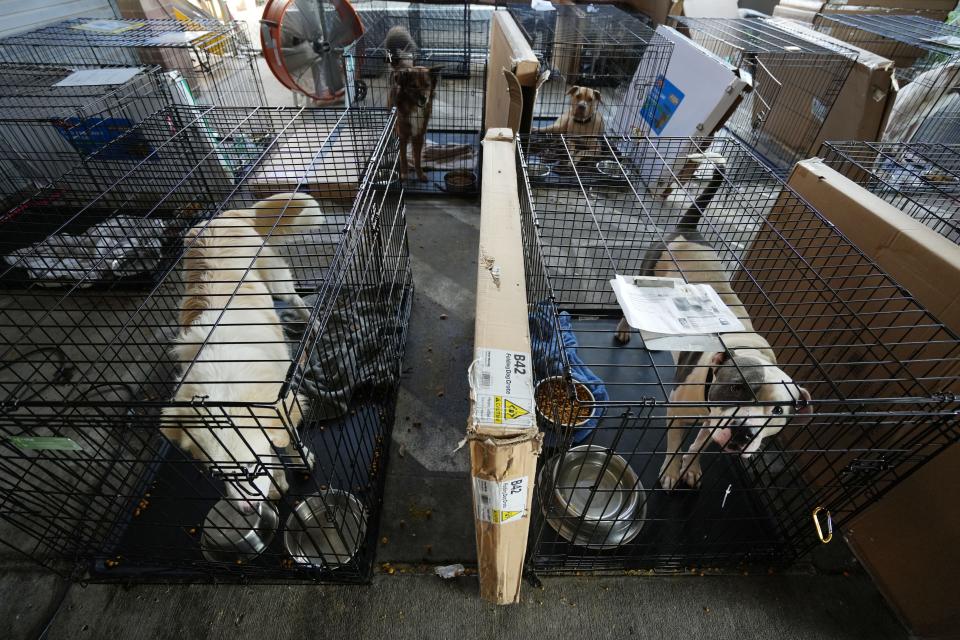Should 'puppy mill' animals be sold in pet stores? Why one Texas conservative says no
AUSTIN — Dogs and cats bred in so-called puppy or kitten mills could not be sold in retail pet stores in Texas' 24 largest counties under pending legislation that has united a conservative Republican lawmaker with one of the state's leading animal protection organizations.
The measure, House Bill 870 by state Rep. Jared Patterson of Frisco, is similar to legislation that cleared both chambers in different versions two years ago only to die when compromise language could not be reached before the 2021 session ended. Patterson said he hopes to move faster on the measure this session to make clear those who breed animals in sometimes cruel situations will find an unwelcome market in Texas.

"I just want to try to shut this pipeline of puppy-mill dogs into Texas down," Patterson said. "I'm hopeful we can get it done."
What the pet store bill would do
According to the official analysis of the 2021 version, Patterson's bill would address concerns that dog and cat buyers who patronize "bad actor" pet stores might be "purchasing animals with undisclosed health defects that can lead to increased veterinary costs and, in certain cases, even death of the animal."

The analysis went on to say that "millions of dogs and cats are sold annually by breeders across the country, while dogs and cats that are in need of a home are left in shelters and euthanized." The official analysis for the 2023 version, which is nearly identical to the original, has not yet been published.
The bill would permit retail pet stores in counties with a population of 200,000 or more to sell dogs and cats that were provided by an animal control agency, an animal shelter or an animal rescue organization. The stores would be required to maintain records on the origins of the dogs and cats offered for sale and make such information publicly available.
"A pet store shall post in a conspicuous location affixed to the enclosure of each dog or cat available for sale the name of the animal control agency, animal shelter, or animal rescue organization from which the pet store obtained the dog or cat," according to the text of the bill.
What about licensed breeders?
Patterson and Shelby Bobosky, executive director of the Texas Humane Legislation Network, said the legislation would not interfere with legitimate sales of dogs for hunting and those that compete in dog shows, or with buyers who prefer certain breeds and obtain them through licensed breeders.
"In my family, we have adopted a pet from a shelter. We've also purchased a pet from a breeder," Patterson said. "This has no effect, really, on breeders. You can still search out a breeder or find a breeder that does whatever type of dog that you want, and you can go purchase that dog."
Bobosky said Texas is already overpopulated with dogs and cats awaiting adoption.
More:Austin's overcrowded animal shelter halts pet intake, cites human affordability issues
"Right now, every single shelter in Texas is struggling," she said. "They are euthanizing dogs for space left and right."
Similar legislation has also been filed by state Rep. Briscoe Cain, R-Houston. His measure, House Bill 3563, would allow stores in counties with a population of 200,000 or more to sell dogs and cats provided by "a qualified breeder." Cain said his bill is similar to the compromise that was being hammered out for the pet store bill that died in 2021.
What is a puppy mill?
The definition of "puppy mills" can vary depending on a person's or organization's point of view. The Humane Society of the United States refers to them as "inhumane high-volume dog breeding facilities that churn out puppies for profit, ignoring the needs of the pups and their mothers." The organization says puppy-mill animals "are often sick and unsocialized."
The World Animal Foundation estimates that as many as 10,000 such mills are operating without a license or regulation in the United States. The facilities churn out about 1 million puppies per year, the organization said.
Some Texas cities have acted on their own
At least 16 Texas cities, including Austin, El Paso, Corpus Christi, Houston and Dallas, have imposed regulations on the sale of dogs and cats in local pet stores. Nine of the cities took action after Patterson's bill died during the 2021 session, and many of the newly adopted ordinances give stores a year or more to comply.
Patterson said his bill would not affect cities that have already acted.
"This would not supplant them," he said of the local ordinances. But it would cover cities in the larger counties that have not enacted their own measures or have ordinances that do not meet the standards of his bill, he added.
Bobosky said she plans to watch for and oppose any bill that would preclude cities of any size from adopting their own local ordinances.
"We are going to reach out to the Texas citizens and to our grassroots lobbying efforts and we are going to ask the thousands of Texans who agree with these humane pet store ordinances and ask them to help us save these ordinances that we've worked so hard to pass, and that we believe in," she said.
John C. Moritz covers Texas government and politics for the USA Today Network in Austin. Contact him at jmoritz@gannett.com and follow him on Twitter @JohnnieMo.
This article originally appeared on Corpus Christi Caller Times: Why a Texas conservative lawmaker wants to end puppy mill sales in stores

